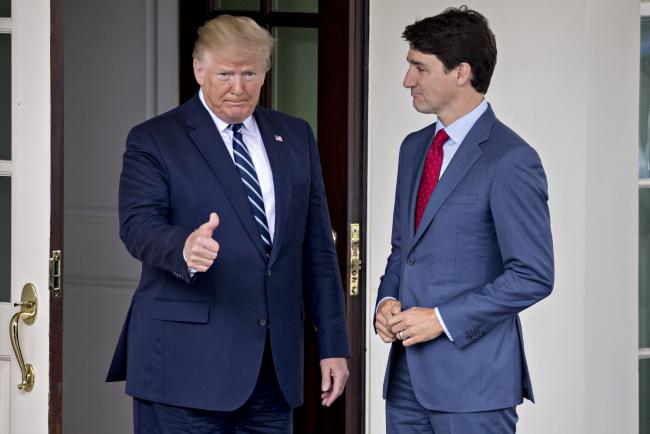
(Bloomberg) — Want to receive this post in your inbox every day? Sign up for the Terms of Trade newsletter, and follow Bloomberg Economics on Twitter for more.
When President Donald Trump signed the U.S.-Mexico-Canada-agreement at the White House in late January, he said a variation of the word “thanks” 54 times in 37 minutes to people in attendance who helped him do the deal.
But there’s one more favor he needs from someone who wasn’t in the room: Canadian Prime Minister Justin Trudeau.
That’s because USMCA has a final gauntlet to run — Canada’s parliament — before anyone can fully claim credit for updating Nafta.
And the path through Ottawa won’t necessarily be fast.
For starters, don’t call it USMCA. It’s CUSMA in Canada. Bill C-4 to implement the deal was introduced Jan. 29 by Deputy Prime Minister Chrystia Freeland, who in her previous role as foreign minister was the top negotiator for the agreement.
C-4 is likely still weeks away from becoming law, meaning it could be several months before CUSMA actually comes into force. The pact was designed to take effect on the first day of the third month after all countries have signed off. The U.S. and Mexico have given the final nod, so everyone’s waiting on Canada.
The bill is now before the standing committee on international trade, which has started hearing from witnesses. More hearings are scheduled for next week, and more witnesses could still be called. In addition, the committee will vote next week on whether to invite other committees, for instance on agriculture, to submit recommendations, with a proposed deadline of April 2.
Once the committee has heard from witnesses, the bill is considered “clause by clause,” then voted on. It goes back for a final reading in the House of Commons, and then through a similar process in the Senate. Only when it’s passed by both houses can it receive Royal Assent and become law.In other words, there’s still a ways to go.
Although CUSMA has broad Canadian support, it’s more difficult now for Trudeau to jump through all the legislative hoops because he lost his majority in the House of Commons in elections back in October. While he’s almost certain to get enough support from opposition parties to pass the bill, that doesn’t mean everyone’s happy with it. Lawmakers have voiced dissatisfaction with provisions including a new dairy export tariff, the treatment of aluminum versus steel, and a requirement to get permission from the U.S. to sign deals with other countries.
Trudeau’s Liberals are under pressure to get CUSMA passed quickly, but opposition lawmakers say they won’t be rushed.
One thing to watch: Whether Canadians get worried that the U.S. will withdraw from the World Trade Organization’s government procurement deal (as Bloomberg reported earlier this month was under discussion). Procurement was a contentious issue in USMCA. Freeland and U.S. Trade Representative Robert Lighthizer spoke about the matter last week but agreed to keep the conversation private.
So any gratitude from Trump to his Canadian counterpart may have to wait a few more months.
Charting the Trade War
The U.S. is weighing a plan to increase its long-standing ceiling on tariffs — or bound rates — in a move meant to trigger a renegotiation of relationships with fellow World Trade Organization members and step up its assault on the global trading system. Trump and senior aides have long complained that other countries can charge higher tariffs on certain products than the U.S. does. Now, they’re threatening to upend agreements made by previous administrations over decades of negotiations, according to people familiar with the discussions.
Today’s Must Reads
- Energy levels | Industry leaders warned the Trump administration that the U.S. will struggle to produce the oil, gas and other energy products that China has committed to buy in a new trade deal.
- Virus update | Economists are more pessimistic for a speedy recovery for China’s virus-hit economy, as evidence mounts that the disruption will longer-lasting than first thought.
- Trouble already | Less than two weeks after leaving the European Union, the U.K. is already back in trouble with the bloc over an obscure transport tax that the EU doesn’t like.
- Sugar high | Just as the world’s top sugar traders forecast a global shortage of the commodity, No. 1 raw-sugar importer Indonesia says it wants a record amount of the sweet stuff.
- Punishing Cambodia | The EU decided to impose trade sanctions against Cambodia because of alleged human-rights violations, making good on a threat with tariffs on 1 billion euros of imports from the country.
Economic Analysis
- Shipping rates | Trans-Pacific liners may begin to feel coronavirus fallout as containter rates fall.
- Southern (NYSE:) comfort | USMCA ratification is more relief than opportunity for Mexico.
Coming Up
- Feb. 14: EU trade balance
- Feb. 19: Japan trade balance
- Feb. 21: South Korea 20-day exports and imports
- Britain’s departure from the EU on Jan. 31 marked the start of a new, more complex phase of the negotiations. Click here for a timeline to the year ahead.
Like Terms of Trade?
Don’t keep it to yourself. Colleagues and friends can sign up here. We also publish Balance of Power, a daily briefing on the latest in global politics.
For even more: Subscribe to Bloomberg All Access for full global news coverage and two in-depth daily newsletters, The Bloomberg Open and The Bloomberg Close.
How are we doing? We want to hear what you think about this newsletter. Let our trade tsar know.



